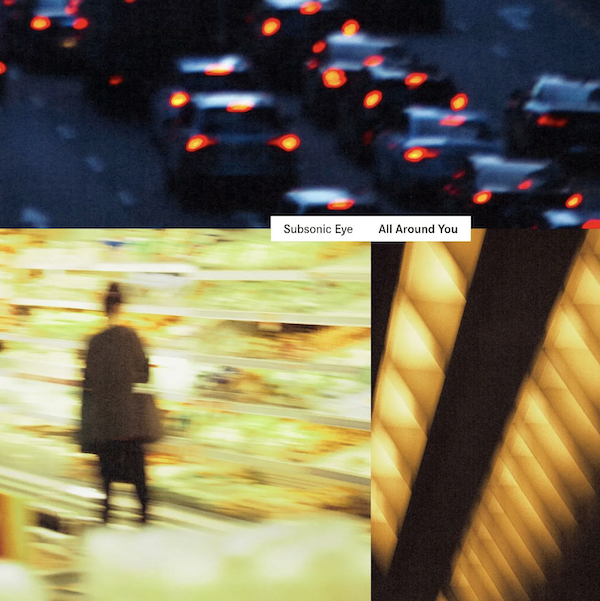December Add of the Month: Subsonic Eye’s “All Around You”
Words by Marion Suchowieky
Our Internal Music Director explores the artistry of December 2023’s Add of the Month and dives into the music department’s reasoning for adding Subsonic Eye’s “All Around You” to the KCSB library.
Singaporean shoegaze heroes Subsonic Eye released their fourth record, All Around You, in September 2023. The band, composed of singer Nur Wahidah, guitarists Daniel Borces and Jared Lim, bassist Samuel Venditti, and drummer Lucas Tee, categorically critique modern society’s consumerist and performative “rat-race” reality. However, they still maintain a humanistic perspective, refraining from disqualifying the power of human connection, of simple pleasures, and the joy of feeling.

Sharp critiques found in tracks like “Performative” are contrasted with songs like “Yearning” and “Tender” which focus on nature, love, and innocence, marked by Subsonic Eye’s optimistic touch. This is an album about the overpowering force of small and tender moments, which imbue an otherwise devoid life with so much meaning.
The opening track, “Performative,” begins with a kaleidoscopic collection of chimes and synthesizers which slowly become overpowered by the decisive strumming of traditional Sonic-Youth-Teenage-Riot-esque guitars. Perhaps this choice in instrumentation is meant to signify the wonders of nature and of the human mind being overtaken by the hum-drum of industrialization and routine.
The lyrics of the song are pessimistic – “hands outstretched now/I don’t even know/if it’s working, better, anymore.” Nur Wahidah follows these opening lines with descriptions of pedantic and modern life routines – “checking boxes/charging laptops/separating causes from ourselves.” These lines create a character who, in the midst of a fast-paced world, has become detached from the joys of living with purpose. It is a defeated attitude, perhaps rightfully so. The song ends with “hands outstretched now, I don’t even know/if I’m sleeping, living, for who or what.” Lyrics embedded with undeniably Marxist character provide a powerful beginning to this shoegaze magnum opus.
In the second track, “Circle,” Wahidah expands on this feeling of simultaneous detachment and entrapment. Here, the lyrics employ a labyrinth as a metaphor- hence the song’s title – in which the writer seems to be stuck. This is evidenced by the opening line, “dead end again,” which eventually develops into “it’s just a circle/stuck in this labyrinth” by the bridge. This song in particular beckons images of George Orwell’s 1984 authoritarian and industrial dystopia by the outro with the lyrics “they might be on to me” repeated over and over again. Referencing the age of mass surveillance we find ourselves in, Subsonic Eye emphasizes that privacy seems like a forlorn fantasy. This feeling of paranoia is further echoed by the instrumentation; the drums are ceaseless throughout the whole song, playing fast and busy beats. The guitars – drenched in signature shoegaze fuzz, chorus, and reverb pedals – play repetitive melodies with fast rhythms that provide a curtain of sound for the vocals to stand out against.
In “Bug in Spring,” the album’s third track, nature is properly introduced as a theme of the album. We follow the narrator on a stroll, where they take in the wind, someone else’s gaze, and the innocent act of catching a bug in their hand. As they allow themselves to surrender to these simple pleasures, the instrumentation opens up. The tone of the guitars is a little bit brighter, one of the guitarists even includes a few sweet harmonics. However, this optimism is quickly cut short with “J-O-B,” a song, quite simply, about hating one’s job and not being able to quit it because the rent needs to be paid. This song is perhaps the most poignant and in-your-face moments of Wahidah’s lyricism – here she she tells us exactly what the album is about.
“What I Meant” is about the negative effects that result when working in a consumerist society and how it impacts interpersonal relationships. The song preaches about how humanity gets erased and deconstructed in order to meet productivity quotas. The narrator of this song is so detached from their humanity that they are unable to understand their past, how they got to where they are, and cannot even connect with the words that come out of their mouth. A companion song to “What I Meant” is “Pick Up The Phone,” which immediately follows. This song is perhaps the most heartbreaking of the whole record. The narrator expresses the feeling of getting home with the whole day gone and, seemingly, wasted. The only comfort they have is the connection with a special person, who unfortunately will not pick up the phone. The song continues to accomplish the record’s mission of highlighting the power and importance of human connection, but it also highlights the sad reality of living a life that does not seem to be wholly within one’s control.
In “Machine” Wahidah describes the mechanistic rhythms of her life. Though she touches upon many of the same sentiments as the prior song, this one feels more defiant. Particularly in the verse in which she says “depending on my mood/I might be screwing on the company’s own time.” This line utilizes a bit of irony and humor to highlight the absurdity of a system in which one does not own their own time. This song features one fuzz-laden guitar track, while another track takes a frustrated and defiant solo. Towards the end of the lyrics, the singer makes fun of the meditation craze which seems to have sprung up as an attempted antidote to the sense of alienation ever present in our society.
In “Yearning,” the band focuses once again on the desire for human connections and the power they can have on one’s life. The ending of the song finds Wahidah repeating over and over again “you woke me from my slumber.” In this context, slumber might refer to living one’s life on automatic- not having control of one’s life, not chasing one’s passions, being totally and completely consumed by fulfilling the bare necessities. While this is sometimes inevitable, and often out of a person’s control, having meaningful relationships with other people can provide more meaning than any material circumstance.
The last track, “Everything” finds the narrator transitioning from the inward exploration of themselves and addressing the audience instead. In this track, Wahidah lays her cards on the table. Sure, life might be a little devoid of meaning in the grand scheme of things. Does that take away from its beauty? The beauty of the “wildflowers growing in our carparks”? Must we demand sense and structure from things that are perhaps senseless and structureless? This gets to the core of the album’s message, which is what I believe other reviewers have missed. The album is not pessimistic – though it does spend a great deal of time talking about our society’s faults. The point Wahidah is attempting to drive home here is that the joy of life is in the small, spontaneous moments, when a person catches a bug in their hand or feels the breath of another person as they fall asleep. It is in the sunsets, birdsongs, sunrises, and rogue wildflowers that one can encounter pure and genuine joy. So, Wahidah begs, let’s surrender to the world, let everything wash over us, all we can really do is keep our eyes open and hope to witness.
